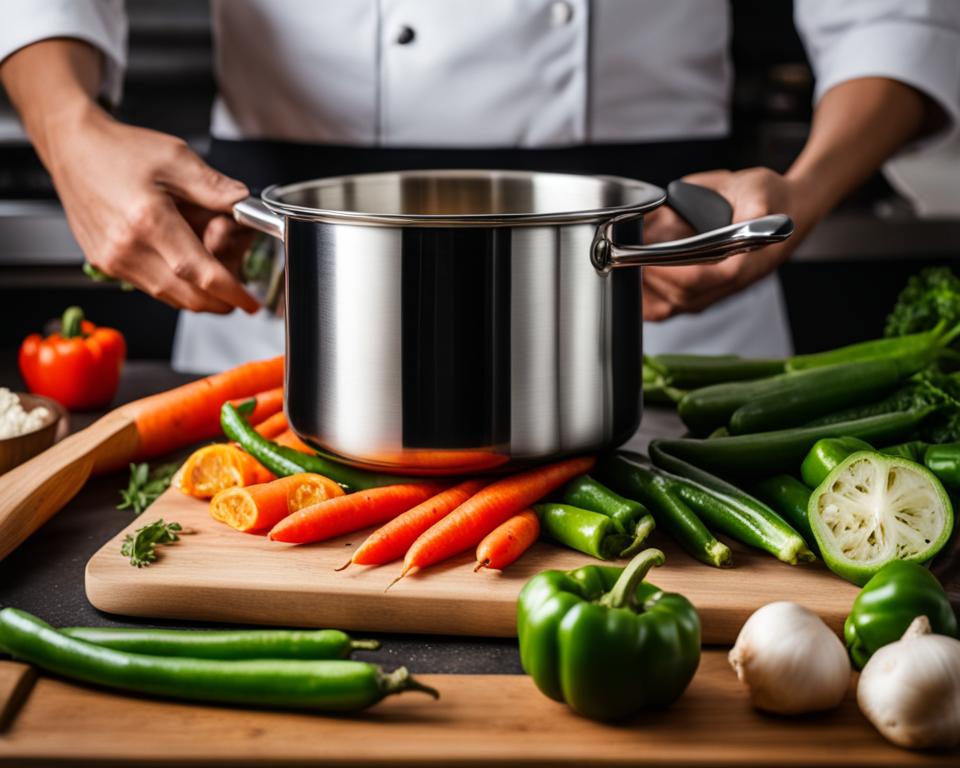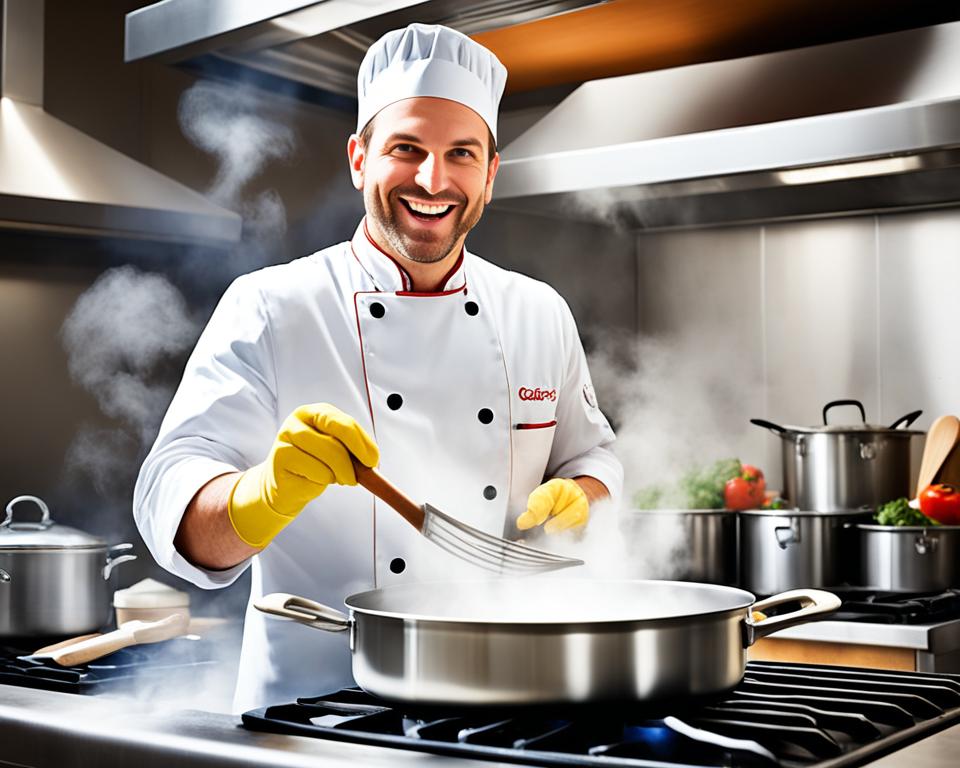Introduction
Emerald cookware is a type of cookware that is made from a combination of recycled glass and aluminum. It is known for its durability, heat retention, and non-stick properties. Emerald cookware is also considered to be environmentally friendly, as it is made from recycled materials.
Types of Cookware
There are many different types of cookware available on the market, each with its own unique set of features and benefits. Some of the most common types of cookware include:
- Stainless steel cookware
- Aluminum cookware
- Cast iron cookware
- Copper cookware
- Nonstick cookware
Each type of cookware has its own advantages and disadvantages, so it’s important to choose the right type for your needs. For example, stainless steel cookware is durable and versatile, but it can be difficult to clean. Aluminum cookware is lightweight and heats up quickly, but it can be prone to warping. Cast iron cookware is durable and heat-retaining, but it requires seasoning and can be difficult to clean. Copper cookware is highly conductive and heats evenly, but it is also expensive and requires special care. Nonstick cookware is easy to clean and non-stick, but it can be more expensive and may release harmful chemicals when heated.
Types of Cookware
There are many different types of cookware available on the market, each with its own unique set of features and benefits. Some of the most common types of cookware include:
* **Stainless steel:** Stainless steel is a popular choice for cookware because it is durable, versatile, and easy to clean. Stainless steel cookware can be used for both stovetop and oven cooking.
* **Cast iron:** Cast iron is a heavy, durable material that heats evenly and retains heat well. Cast iron cookware is ideal for searing, frying, and baking.
* **Aluminum:** Aluminum is a lightweight material that heats up quickly. Aluminum cookware is a good choice for boiling water and making sauces.
* **Copper:** Copper is a good conductor of heat, which makes it ideal for searing and frying. Copper cookware is also relatively expensive.
* **Nonstick:** Nonstick cookware is coated with a material that prevents food from sticking to the pan. Nonstick cookware is a good choice for people who want to make quick and easy meals.
* **Ceramic:** Ceramic cookware is made from a combination of clay and minerals. Ceramic cookware is heat resistant and can be used for both stovetop and oven cooking.
The type of cookware you choose will depend on your cooking needs and preferences. If you are unsure of what type of cookware to buy, consult with a salesperson at your local kitchen store.
IV. How to Care for Cookware
Emerald cookware is a type of cookware that is made from a combination of ceramic and glass. It is known for its durability, non-stick properties, and ability to withstand high heat. However, like all cookware, emerald cookware requires proper care in order to maintain its performance and appearance.
Here are a few tips for caring for your emerald cookware:
- Wash your emerald cookware by hand with warm, soapy water. Do not use abrasive cleaners or scouring pads, as these can damage the surface of the cookware.
- Do not use metal utensils on your emerald cookware, as these can scratch the surface. Use only wooden or silicone utensils.
- Do not dry your emerald cookware on a hot burner or in the oven. Allow it to air dry completely on a towel.
- Do not store your emerald cookware in a damp place. This can cause the cookware to rust.
By following these tips, you can help to extend the life of your emerald cookware and keep it looking its best.
V. Cleaning Cookware
Cleaning cookware is important to keep it in good condition and to prevent the spread of bacteria. Here are some tips for cleaning emerald cookware:
- Wash emerald cookware by hand with warm, soapy water.
- Avoid using harsh abrasives or chemicals, as these can damage the cookware.
- Rinse emerald cookware thoroughly after washing to remove all soap residue.
- Dry emerald cookware thoroughly before storing it.
If emerald cookware is stained, you can try soaking it in a solution of white vinegar and water. You can also use a commercial cookware cleaner, but be sure to follow the directions on the product label.
Here are some additional tips for cleaning emerald cookware:
- Do not use metal utensils on emerald cookware, as this can scratch the surface.
- Do not use emerald cookware on high heat, as this can damage the cookware.
- Do not store emerald cookware in direct sunlight, as this can fade the color.
VI. Storing Cookware
Storing your cookware properly will help to extend its lifespan and keep it looking its best. Here are a few tips for storing cookware:
* **Store cookware in a dry place.** Moisture can cause rust and corrosion, so it’s important to store your cookware in a place where it will stay dry.
* **Stack cookware carefully.** When stacking cookware, make sure that the pieces are not touching each other. This will help to prevent them from scratching or chipping.
* **Use protective covers.** If you have delicate cookware, you may want to use protective covers to keep it from getting scratched or damaged.
* **Rotate your cookware.** If you have a lot of cookware, it’s a good idea to rotate it out of storage every so often. This will help to prevent any one piece from getting too much wear and tear.
By following these tips, you can help to keep your cookware in good condition for years to come.
VII. Safety Tips for Cookware
Here are some safety tips for using cookware:
- Always use potholders or oven mitts when handling hot cookware.
- Never leave hot cookware unattended on the stovetop or in the oven.
- Be careful not to spill hot oil or grease when cooking.
- Never place hot cookware directly on a cool countertop or tile floor.
- If you accidentally drop a hot pot or pan, do not try to catch it. Let it fall to the floor and then carefully pick it up with potholders or oven mitts.
For more information on cookware safety, please consult the manufacturer’s instructions.
Cookware Trends
There are a number of new trends in cookware that are emerging in 2023. These trends include:
- The use of sustainable materials, such as recycled aluminum and bamboo
- The rise of non-stick cookware that is free of harmful chemicals
- The increasing popularity of induction cooking
- The development of new cooking technologies, such as air fryers and sous vide
These trends are all indicative of the growing demand for healthier, more sustainable cooking options. As consumers become more aware of the environmental impact of their food choices, they are looking for ways to reduce their carbon footprint. They are also looking for cookware that is safe for their health and that will make cooking easier and more enjoyable.
The cookware trends of 2023 offer a variety of ways to meet these demands. Sustainable materials, non-stick coatings, and induction cooking are all ways to cook healthier and more environmentally friendly. Air fryers and sous vide are new cooking technologies that can make cooking easier and more enjoyable.
By choosing cookware that reflects these trends, you can cook healthier, more sustainably, and more easily.
Frequently Asked Questions
Here are some frequently asked questions about emerald cookware:
-
What is emerald cookware?
-
What are the benefits of emerald cookware?
-
What are the drawbacks of emerald cookware?
-
How do I care for emerald cookware?
-
How do I clean emerald cookware?
-
How do I store emerald cookware?
-
What are some popular brands of emerald cookware?
-
Where can I buy emerald cookware?


